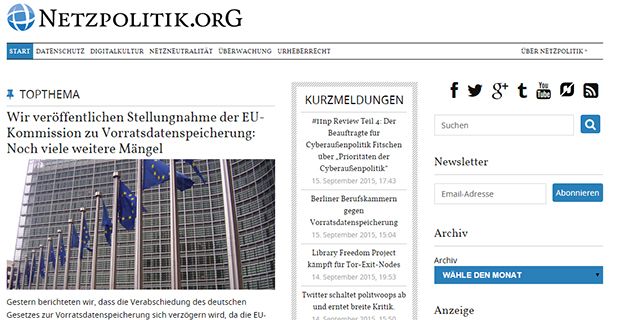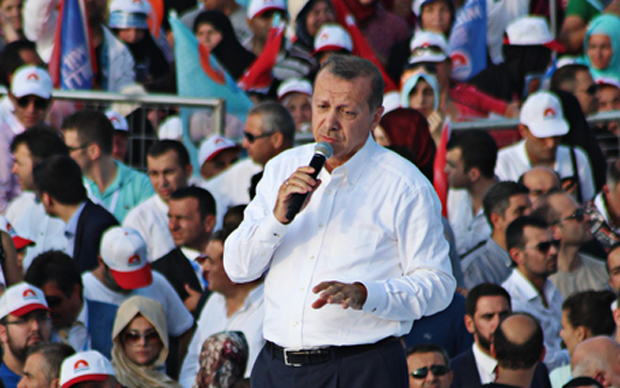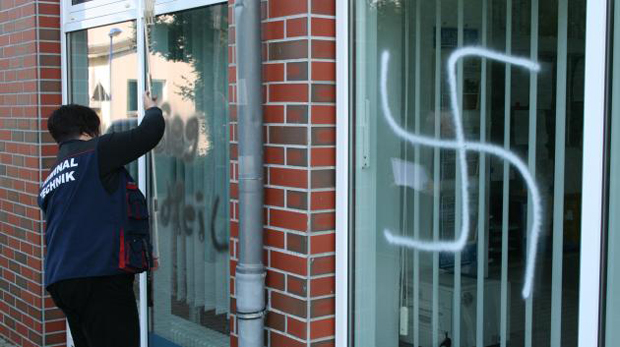Index relies entirely on the support of donors and readers to do its work.
Help us keep amplifying censored voices today.

Over a month after the Berlin-based blog Netzpolitik.org was charged with treason for publishing leaked government documents, details are trickling out about the extent German authorities went to in order to build a case against the journalists running the website.
The German federal attorney general’s legal case turned out to be flimsy and ultimately collapsed on 10 August. Leading up to the decision to drop the case, public outrage soared over the treason accusation. Journalists associations jumped to the cause and a Berlin protest attracted thousands of supporters. Donations poured in to help the bloggers’ legal battle.
But before they gave up, authorities dug deep to try to scrape together evidence against Netzpolitik and its editors Markus Beckedahl and Andre Meister.
After weeks of delay the bloggers finally received partial information from their case files. The documents show that German state police obtained a nine-page file on the two Netzpolitik editors’ social security, private residence registrations and bank accounts.
Public broadcaster NDR wrote of the finance probe, “Obviously the authorities hoped by looking at the bank account documents they would be able to find a whistleblower who might have given the journalists documents from the Federal Office for the Protection of the Constitution [Verfassungsschutz].”
Netzpolitik was first informed about the treason investigation on 30 July 2015. The charge was raised after the blog published classified documents from the Verfassungsschutz, Germany’s domestic intelligence agency.
NDR reported this week that over a hundred of the agency’s employees had access to those documents.
Harald Range, the federal attorney general who launched the case, was forced into early retirement when the legal inquiry became a political scandal in August.
Since then, reports have come out suggesting top officials at the federal ministry of justice, the ministry of the interior, and even the chancellor’s office knew about the charges, as well as Verfassungsschutz chief Hans-Georg Maaßen. Government ministers have played dumb about the case in an attempt to shift blame onto the prosecutor’s shoddy execution.
“We want the responsible people to take responsibility,” Netzpolitik reporter Anna Biselli told Index on Censorship.
“For us it’s quite clear he [Range] would be fired because he was going to retire in half a year anyway,” she said.
The case against Netzpolitik marked a historic low for Germany, which ranked number 12 in Reporters without Borders’ 2015 World Press Freedom Index.
Hendrik Zörner, spokesperson for the German Journalists’ Association (DJV), said, “From the beginning we saw the risk that journalists would become intimidated by the investigation against Netzpolitik.org.” Zörner also acknowledged that its hard to determine whether there are now chilling effects for journalists in Germany.
Biselli told Index on Censorship that the website was propped up by a flow of support.
“We have a lot of offers for support even from some of the journalist unions, there are many people donating and others offering to look into legal things for us. So that is really positive,” Bisselli said.
The investigation of Netzpolitik is the first time German authorities have pursued a legal case against journalists since 1962, when the well known magazine Der Spiegel was charged with treason for publishing state secrets about the West German military. The magazine shut down temporarily while its founder Rudolf Augstein served 103 days in jail.
The case was dismissed by a federal court.
Spiegel later brought a complaint before Germany’s constitutional court in 1966. Even though the magazine’s complaint was rejected, the court issued a landmark decision that referred to the possible “healing” effects of journalism. Spiegel’s articles on the classified defence information, the court ruled, could “in the long term be more important for the welfare of the Federal Republic than confidentiality.”
“Scarily similar to the Netzpolitik.org case, the information leaked was actually not so new. Large parts of it had already been published before,” wrote Jeanette Hofmann, director of the Berlin-based Institut für Internet und Gesellschaft, in an op-ed last month for the website Internet Policy Review.
“A betrayal of state secrets requires by definition that there is a secret,” Hofmann wrote.
Considering the classified information at the heart of both the Spiegel and Netzpolitik investigations had already been reported, Hofmann argued, calling the documents “state secrets” was always a stretch.
|
Mapping Media Freedom
|
This article was published on 16 September 2015 at indexoncensorship.org

Former Turkish Prime Minister and current president Recep Tayyip Erdogan spoke to tens of thousands of supporters during a presidential campaign rally in Istanbul in early August. (Avni Kantan / Demotix)
Seven months after a previous amendment was introduced to Turkey’s contentious 5651 law governing internet activity, new restrictions were passed late on September 8. Before the February amendments were signed into law by then President Abdullah Gül, a protracted approval process over the course of a few weeks helped bring attention to the proposals. In contrast to the online and street protests against internet censorship that preceded the amendments’ approval earlier this year, last week’s changes to the 5651 law were rushed through a vote before word could spread about them.
The newest restrictions are only two articles tucked into a lengthy omnibus reform bill: in a total of seven sentences, amendments number 126 and 127—part of a list of 146—succinctly make way for invasive data logging and the speedier blocking of access to websites. Nihan Güneli, an Istanbul-based technology and media lawyer, said the hurried vote on the bill kept opposition to the internet regulations muffled. When the details of the earlier 5651 amendments were first presented in January, Güneli said, “everybody was protesting it. I believe that was one of the main reasons Abdullah Gül rejected these two main articles. But this time we didn’t have any time. We just saw the article and everybody was shocked.”
Before approving the last amendments in February, Gül urged legislators to adjust two of its articles: one measure allowing for Turkey’s Telecommunications Directorate (TİB) to block access to some websites within four hours – without a court order, was changed to require judicial review. Another measure that gave TİB the right to collect internet users’ data was changed to restrict access to user logs.
Former Prime Minister Erdogan replaced Gül as Turkey’s new president on August 28. Less than two weeks after his inauguration, these newest internet restrictions allow for websites to be blocked within four hours if their content is ruled a threat to national security or public order, or if restricting access to them can prevent a crime. Under the new amendment, TİB is also allowed to store internet users’ traffic logs and metadata. In an attempt to make the February bill amendable to critics, these two most offensive parts of the previous amendments to 5651 were dropped at Gül’s request. Now exactly those measures have been quietly put into effect under Turkey’s new president.
The targeting of websites determined to be threats to national security comes after the Turkish government struggled to suppress a series of leaked phone recordings earlier this year that spread on social media. The wiretapped phone conversations featured what appeared to be the voices of Prime Minister Erdogan and people close to him, and pointed to their implication in an ongoing corruption scandal. Other recordings ostensibly showed Erdogan’s meddling in the judiciary and with owners of major media outlets. In March, a leaked recording from a meeting at Turkey’s foreign ministry detailed the government’s considerations for military involvement in Syria. Shortly after that recording was posted on YouTube, access to the platform was blocked entirely in Turkey.
YouTube is one prominent example of access restrictions prior to the most recent legislation reform—the website was previously banned for over two years up until 2010. The possible effects of the newest amendments’ measures for blocking websites are still unclear, although the implications for access to information are startling. A number of small, alternative news websites have been aggressively covering the Turkish government’s recent corruption scandal. With no offline distribution form, their livelihood would be put at risk if their websites became inaccessible.
The news website Diken was founded in January 2014 and has since gained a following for its alternative reporting. In June, Diken was named “internet newspaper of the year” by an environmental organisation. Editor in chief Erdal Güven says Diken published almost every one of the leaked government phone recordings earlier this year. So far, Diken has not been shut down or admonished by authorities, which Güven suggests may be because the website is still less than one year old and may not be considered a sufficient threat. Diken risks being targeted by TİB at any point, though, says Güven. “It depends on an advisor to a minister, an MP, the president. Just to read a story of ours and then complain to the legal authorities,” Güven said. Referring to the fines media companies can face for publishing information deemed illegal, Güven added, “They can ask us to pay a huge amount of money. We don’t know what they will do. We don’t have a huge amount of money, we have a tight budget. Of course this would affect us.”
Because of their editorial choices and coverage of government scandals, alternative news sources and social media are the main targets of the new restrictions on website access. Elif Örnek, a reporter for the leftist newspaper soL, says that journalists are often pressured or face censorship, and in reporting on issues that the government is trying to suppress, like the leaked phone recordings, the stakes can be especially high for the media. “The main thing is that when you’re thinking about the public interest, there are some dangers you have to risk,” Örnek said.
For internet users, TİB’s broad collection of metadata is a newly legal tool for monitoring online activity. Nihan Güneli says it’s impossible to predict how TİB will purpose users’ traffic logs. “Within six months, maybe we’ll hear about a case, maybe somebody will be arrested or someone committed a crime and we’ll see this traffic information in court. Then we’ll know what they’re doing with it,” Güneli said. Censorship of websites within Turkey is not new, making it hard to predict whether the new bill’s other article, which gives TİB the authority to block sites within four hours, will have palpable effects on access to information. “TİB has power right now and nobody knows what they’re going to do with it. I don’t think they know either,” Güneli said.
Media violation reports from Turkey via mediafreedom.ushahidi.com
Twitter account of Today’s Zaman editor faces closure
Journalist kidnapped and released by PKK
Report shows media use of hate speech increased in early 2014
Several media organisations denied accreditation to AK Party congress
This article was posted on 24 Sept 2014 at indexoncensorship.org

Vandals attacked the Lausitzer Rundschaufor the second time in a week.
On the night of September 4-5, the daily newspaper Lausitzer Rundschau became victim to a crime by now familiar to its employees: neo-nazis vandalised the outside of one of its office buildings in the eastern German city of Spremberg, covering it with anti-Semitic graffiti. Less than a week later, on the night of September 8-9, another Lausitzer Rundschau office in the nearby city of Lübbenau faced a similar attack.
The incidents were covered by national and local media in Brandenburg, the state surrounding Berlin. Right-wing extremism has been a sensitive topic for the Lausitzer Rundschau—only two years ago, the newspaper’s Spremberg office was also vandalized by neo-Nazis who left graffiti and an animal carcass outside the building. Shortly before the 2012 attack, the newspaper had reported critically about a right-wing extremist march in Spremberg.
Klaus Minhardt, president of the German Journalists’ Association’s local Berlin-Brandenburg chapter, sees offences like the ones against Lausitzer Rundschau as motivated by a small group of individuals lashing out against specific media reports.
“People like to make journalists their victims and to take revenge out on them. Usually, somebody does something bad and the journalist who uncovers that becomes the face of the issue,” Minhardt said.
A few days before the September 4 attack, Lausitzer Rundschau ran a report on a trial in the nearby city of Cottbus, where police testified that right-wing extremist paraphernalia was found on an alleged assailant’s body. Johannes M. Fischer, editor in chief of Lausitzer Rundschau, says the newspaper’s reporting on the trial is one reason for the recent vandalism. Another, says Fischer, is the upcoming Brandenburg state elections on September 14. Election posters in the area surrounding Lausitzer Rundschau’s offices were also covered in anti-Semitic graffiti after both of the new incidents.
This past week’s attacks on the newspaper were shocking because they were repeated in quick succession. According to Fischer, the kind of vandalisation was also more brutal than the previous incident in 2012.
“The quality is different. It has a horrible quality. The sayings are more violent. ‘Jews, Jews out, gas Jews,’ which was abbreviated as VE.G.,” Fischer said.
Because of the proximity between the two offices in Lübbenau and Spremberg, police have said that the same people are likely responsible for both of the September attacks on Lausitzer Rundschau. Fischer is also convinced that a only a few dozen people are behind the vandalisation, and he stresses that the Lausitz region is tolerant, while locals have expressed support for the newspaper after the attacks.
Lausitzer Rundschau has become well known for its aggressive reporting on neo-nazi activity in the region, which covers parts of the eastern German states of Brandenburg and Saxony. In 2013, two of the newspaper’s reporters won national prizes for their work on right-wing extremists in the area.
The “tough staff,” Fischer says, is not intimidated by the attacks on their offices and is determined to continue covering neo-nazi groups there. Fischer still refers to the vandalisation as a threat, and says he has offered reporters various options if they feel uncomfortable working after the attacks.
“They could switch to a different beat. And we also said, ‘You don’t have to write about this topic,’” Fischer said.
None of the Lausitzer Rundschau journalists took Fischer up on that offer. He adds, “They say, ‘Now we really have to do this.’”
More reports from Germany via mediafreedom.ushahidi.com:
Deutsche Welle accused of censorship
Public broadcaster fires blogger
Photographer arrested at protest
ECHR rules court decision to stop publication about Chancellor Schröder was illegal
Head of state chancellery intimidates journalists with legal warning
This article was published on Monday Sept 15, 2014 at indexoncensorship.org

Photo illustration: Shutterstock
Since the beginning of this year, cases of assault against journalists, legal threats and lay offs worsened Turkey’s already precarious state of press freedom.
In May, Freedom House ranked Turkey’s media climate “not free.” The Istanbul-based non-profit news website Bianet publishes quarterly media monitoring reports on press freedom breaches within Turkey. Along with new fines against media outlets and other ominous restrictions, the most recent report shows that physical assault against journalists increased over the last three months. According to the new report, 54 journalists were victims of assault between April and June. Bianet’s previous report documents “at least” 40 accounts between January and March.
Erol Önderoğlu, author of Bianet’s media reports, attributes the increased number of assaults this spring to recent demonstrations where journalists were injured. This May, protestors commemorated the first anniversary of the Gezi Park demonstrations, just a few weeks after large protests took place on May 1. Önderoğlu says police and other security officers are more prone to use violence at protests. “They think they have the right to exert a certain violence against demonstrators,” he says. Önderoğlu sees last year’s Gezi Park protests as a turning point for this kind of aggression towards journalists at demonstrations. Since then, Önderoğlu says, police officers became the main source of violent assault against journalists.
At May 1 protests in Istanbul, at least twelve journalists were injured while reporting. One editor for the news website t24 was detained by police for hours. Violence against journalists erupted again during the Gezi commemorations this year. While reporting live from the protests, CNN correspondent Ivan Watson was harassed by plainclothes security officers who demanded to see his passport. Watson and his crew were then detained and Watson tweeted that he was kneed while in police custody.
Many journalists don’t file legal complaints after they’ve been assaulted. According to Önderoğlu, especially journalists working for mainstream news outlets feel their own jobs may be threatened if they speak out against police. “They have this feeling that by condemning civil servants and police officers for using force, they are in a way putting the board and the directors of their own media organization in a bad position,” Önderoğlu says, adding that because of the lack of editorial independence in Turkey, conflicts with government can lead to journalists being fired. Earlier this year, the extent of Prime Minister Erdoğan’s influence over some media organizations was revealed by leaked phone conversations between Erdoğan and the owners of media outlets, including the newspaper Milliyet and broadcaster Habertürk.
The journalists Ahmet Şık, Onur Erem and Ender Ergün did file a complaint over abuse of authority after being assaulted during the 2013 Gezi Park protests. Six months later, their cases were rejected by an Istanbul prosecutor. Bianet reported that 153 journalists were injured during the Gezi Park protests. There still has not been an investigation into those injuries, and Önderoğlu sees the rejection of Şık, Erem and Ergün’s cases as a bad precedent for assaulted journalists seeking justice. “We need not only the stop of police aggression,” Önderoğlu says, “but also the end of impunity against policemen of such accusations.”
More reports from Turkey via mediafreedom.ushahidi.com:
Turkey: Broadcaster threatens to stop covering presidential candidate
Turkey: Physical assaults on journalists increase
Turkey: Media monitoring agency revokes license for Germany-based broadcaster
Turkey: Prime Minister files legal complainst against newspaper editor
This article was posted on August 1, 2014 at indexoncensorship.org